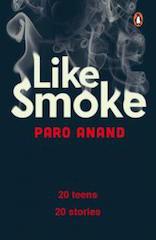
Like smoke cannot exist without fire, so is the case with every human emotion. Emotions result from a myriad of experiences.
Honestly, I haven’t read Paro Anand before, but after having read a few stories from this amazing collection of 20 short stories by her, I was glued. Though the book is meant for young adults, anyone could identify with these stories. This engrossing book can be read in one sitting, but the writer, herself, reveals that the reader can choose to read the stories in no particular order, at a time convenient to them. The emotions are sewn into words in a manner that “the story that catches your eye, matches your mood, scratches your itch.”
I am completely at a loss for words when it comes to describing the gamut of feelings I experienced while reading and even after. Not that I haven’t read books for teenagers before, but there’s something in the lucidity of language, the fluidity of thoughts, and the choice of words that makes “Like Smoke” stand out among others.
Every story in the book transports the reader to that time of youth where conflicts, apprehensions, doubts, dilemmas, new love, angst are realities of the day. The writer chooses to introduce her reader to the politics, society, economy, traditions and culture of India subtly and cautiously so as not to deviate from the themes of youth: friendship, love, religion, death, and hate.
Paro Anand does not create a false image of the world we live in. Her motive seems not to give solutions to problems, but rather to show that each of us has to deal with the hard facts of life, and that we are not alone.
I recommend all to read this book for stories like ‘Those Yellow Flowers of August’, ‘Wild Child’, ‘In the Shadow of Greatness’, ‘See you Shortly’ ‘Jason Jamison and I’, ‘City Boy’. They will make you feel happy or sad, angry or peaceful, and ones like ‘Susu’ will leave you rolling on the floor laughing. All this and more can be said about this interesting read from Paro Anand, but the best is better left unsaid!

Comments
Like Smoke (Paro Anand) – Relatable Teenage Life Stories
Please view my review at
https://doodlesdreamsmusings.wordpress.com/2017/04/07/like-smoke-paro-an...